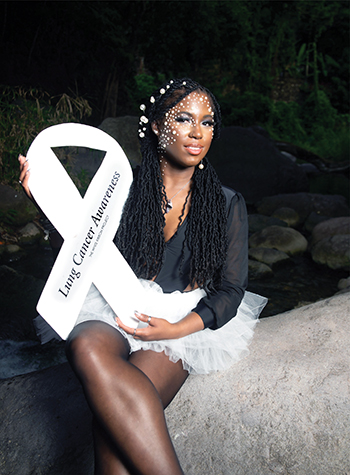Non-Small Cell Lung Cancer Survivor
Pay attention to your symptoms: If you've got lungs, you can get lung cancer

Dr. Sydney Barned had just begun her medical residency in the United States when she was diagnosed with Stage IV non-small cell lung cancer that was ALK-positive. She was only 33 and had never smoked. After receiving targeted therapy for the ALK mutation, her disease is stable, and she’s passionate about recommending biomarker testing for others diagnosed with lung cancer.
M y symptoms started while I was living in Jamaica. I was working in the emergency room and applying for a medical residency in the United States. I have been pretty active my whole life and was an experienced 5K runner. But when I was huffing and puffing like an old man while running and my exercise tolerance was much lower than normal, I knew something was wrong.
A chest X-ray showed a white area at the bottom of the left lobe of my lung. I was diagnosed with walking pneumonia and given antibiotics. It didn’t register with me that it could be something more. Later, after treating the pneumonia, I began coughing, and once coughed up blood. I saw a pulmonologist, who repeated the chest X-ray. The white area was still there. He was not very concerned and said we should repeat the X-ray in a month.
I put off the follow-up X-ray because I was in the process of moving to the U.S. for my internship in the District of Columbia. A few months after starting, I began wheezing. I have a strong family history of asthma and suspected I had it as well. I scheduled an appointment with a pulmonologist in the U.S., but I didn’t get a chance to see her for another 3 to 4 months.
She ordered another chest X-ray. The radiologist read my results as having a “small lower left lobe consolidation.” I knew that an abnormality on chest imaging, in the same spot, so long apart, was not a good thing. I went to my pulmonologist with concerns and requested a CT. The CT showed something blocking part of my airway, which was causing my wheezing. I started to freak out because by then, the white spot had been in my lung for about a year.
The CT also showed a mass so my pulmonologist scheduled a bronchoscopy with a biopsy. The tests confirmed it was cancer. After the initial PET scan, I was referred to a well-known hospital with a Stage I lung cancer diagnosis, and the new doctors ran all of the tests again.
At the second bronchoscopy, the thoracic surgeon removed a few lymph nodes for testing. They were positive for cancer, changing the diagnosis to Stage III lung cancer. When reviewing my PET, my surgeon wanted to do a video-assisted thoracoscopic surgery (VATS) to assess whether cancer was in my pleura.
I was referred to an oncologist with the assumption that I was Stage III and that we would use medication to shrink the tumor and then do a lobectomy. At that visit, the oncologist told me that the pleural biopsy was positive, upgrading me to locally advanced Stage IV. She also said that they had the tissue samples tested for biomarkers, and I was anaplastic lymphoma kinase-positive (ALK+). She told me I would need to be on targeted therapy for life and would not be able to have children due to the medication toxicity to a fetus. I fell apart crying at the visit.
The doctor offered two possible targeted therapy options. My dad, who is a surgeon, reviewed my options with me. Together we chose the drug that looked like it best protected the brain because lung cancer often spreads there.
That medication controlled my lung cancer for five and a half years. Recent scans showed the cancer had spread to my brain. I switched medications to the other possible option because it is known to cross the blood-brain barrier. I’ll continue to get follow-up scans and pray this new medication controls the cancer.
Although facing the brain metastases has been scary, I’m optimistic. I know a lot of people now who have had brain mets and are still alive.
Treatment for lung cancer has changed dramatically in the past few years because of biomarker testing. I think it is very important to get it done immediately at diagnosis because you may be able to go straight to a targeted therapy. I think younger people especially should automatically get biomarker testing.
Support is very important. I’ve had my mother in New York, my dad in Jamaica, a sister in Trinidad and my husband with me in Maryland. He is constantly there for me and a source of great support. I also found that some Facebook support groups offer a lot of knowledge. Connect with others so that you don’t feel alone. Another survivor can offer ideas and suggestions to help because they’ve likely been in your shoes.
Looking back, I realize that I took my healthy status for granted. I was young and naïve to think that because I didn’t smoke that there was no way I could have lung cancer. The stigma associated with lung cancer is stupid. Anyone with lungs can get lung cancer, even people who never smoked.


